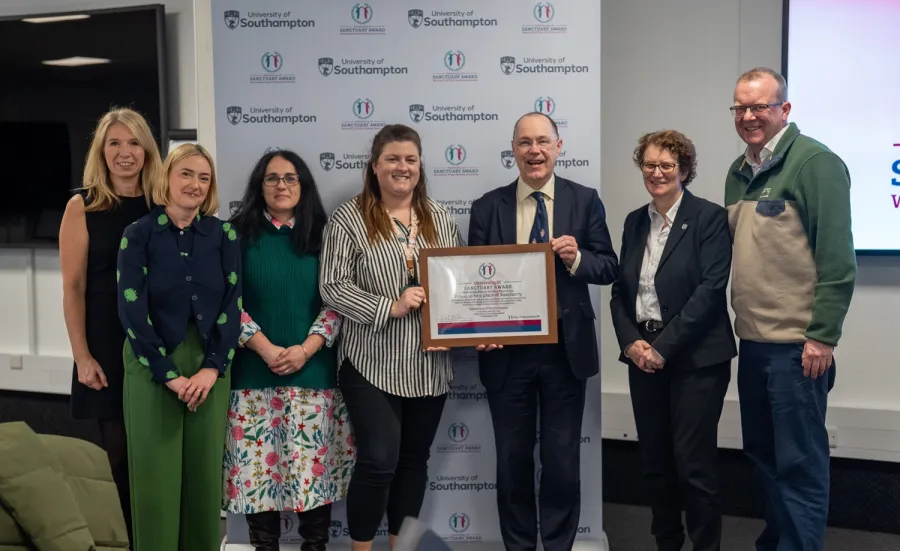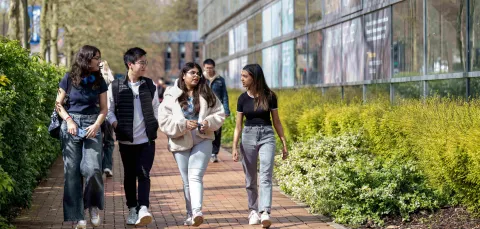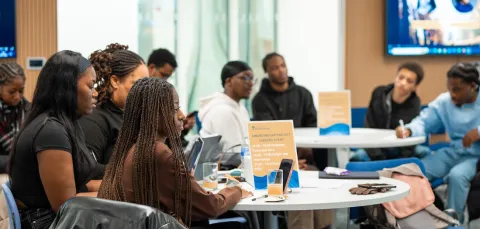We’re equalising access to education, supporting refugees in Southampton, and building a more diverse community as an official University of Sanctuary.
Our position as a University of Sanctuary is one significant example of how we are putting people at the heart of what we do and creating a welcoming and safe environment for our students, staff, and neighbours.
We’ve joined a national network, which recognises higher education institutions dedicated to being welcoming, safe spaces for those who are seeking sanctuary.
Something to be proud of
Being a University of Sanctuary benefits everyone in Southampton, thanks to the opportunities we provide, the networks we’re building, and the awareness we’re raising.
Our Sanctuary work includes offering a Sanctuary Scholarship for students, various University-wide events for students, staff and the local community, and extra support for those seeking sanctuary or who have experienced forced displacement.
Claire Giles, University of Sanctuary Coordinator, was instrumental in obtaining our position in the network. She has seen firsthand how vital this work is at Southampton and how it reflects our University values.
“Our position as a University of Sanctuary showcases what we believe in,” she explains. “It makes me feel proud to work in a place that genuinely cares about people and puts in the work required to support displaced communities.
“We’re putting in the resources and the action where it’s important."
Claire Giles, University of Sanctuary Coordinator
Positive change through scholarships
One of the largest parts of the Sanctuary title involves our Sanctuary Scholarships, which provide four students per year, both undergraduate and postgraduate, with funding for tuition fees and living costs, as well as extra support in areas such as accommodation and wellbeing. Since 2022, the Sanctuary team has supported 15 scholars across different courses.
“The scholarship not only granted me access to higher education at the University of Southampton, but also relieved the financial burdens that often stand in the way of dreams,” explains one third-year Engineering student and Sanctuary Scholar.
“This support has allowed me to focus on my studies, explore new academic horizons, and engage deeply with the University community.
“The team's dedication to creating a University of Sanctuary has inspired me to help others, provide opportunities for them and bring a positive change.”
Third-year Engineering student and Sanctuary Scholar.
Thanks to opportunities like this, the Scholars will go on to make an impact on the world around them, be it through their research or beyond, without being limited by the challenges, dangers and displacement that they have faced.
“We’re supporting individuals and helping them to improve their lives. They fled their homes – not because they want to, but because they had to,” Claire explains.
“A lot of the people who claim asylum are very highly skilled, but they seek sanctuary in countries where their qualifications often mean nothing. They want to work and make their lives better, and as a university, we’re socially responsible to help."
City-wide collaboration
Our Sanctuary status not only benefits our students and staff community, but also the city of Southampton, staying true to our civic priorities and allowing us to contribute to our local area.
We have a strong and growing relationship with local charities and community spaces in Southampton, including City Life Education and Action for Refugees (CLEAR) and the Southampton and Winchester Visitors Group (SWVG). We also play a lead role in the Southampton Sanctuary Network, which has been built to share best practice and improve the lives and opportunities for those seeking sanctuary in Southampton.
By working collaboratively, we can better understand what support is needed, and how we can best help refugee and sanctuary seeking communities using our facilities, research, expertise and reputation, while building trust and knowledge.
“It’s important that we’re setting the precedent of what we want in the city of Southampton,” says Claire.
Local communities on campus
Beyond formal networking and collaboration, we also engage with the refugee community within the University and beyond in the city through social events and volunteering.
Our campuses are open to the sanctuary-seeking community in Southampton and host a variety of events to not only provide support but also spread awareness and educate.
These activities have so far included opening our facilities such as the Union Films cinema for free screenings, holding talks during key points in the year such as Refugee Week and Human Rights Day, organising exhibitions and workshops at John Hansard Gallery and offering a Clinical Legal Education service, all of which enable people in our local area to learn, socialise and gain new skills.
“Quite a few of our students are volunteering in the community, and we have so many pop-up activities which engage with displaced people,” says Claire.
A real-world community
Being a University of Sanctuary benefits the whole University community, not just the Sanctuary Scholars.
Making education accessible to everyone is vital for creating a balanced, equal, valuable and diverse university community, which reflects the world around us.
Our Sanctuary commitment also extends into our research excellence, with academics from displaced backgrounds working in various departments across the University, and others using their expertise to change government policy.
This work proves how vital our different human experiences and perspectives are in making a difference to our planet.
“We really want to widen access to university and have the most diverse student body we can, because that's when you have the richest, most impactful conversations involving lots of different perspectives,” Claire concludes.
“What you don't want is to be sitting in a lecture theatre with everyone who's the same, who has the same experience and the same thoughts, because that's not representative of the real world."
Claire Giles, University of Sanctuary Coordinator


